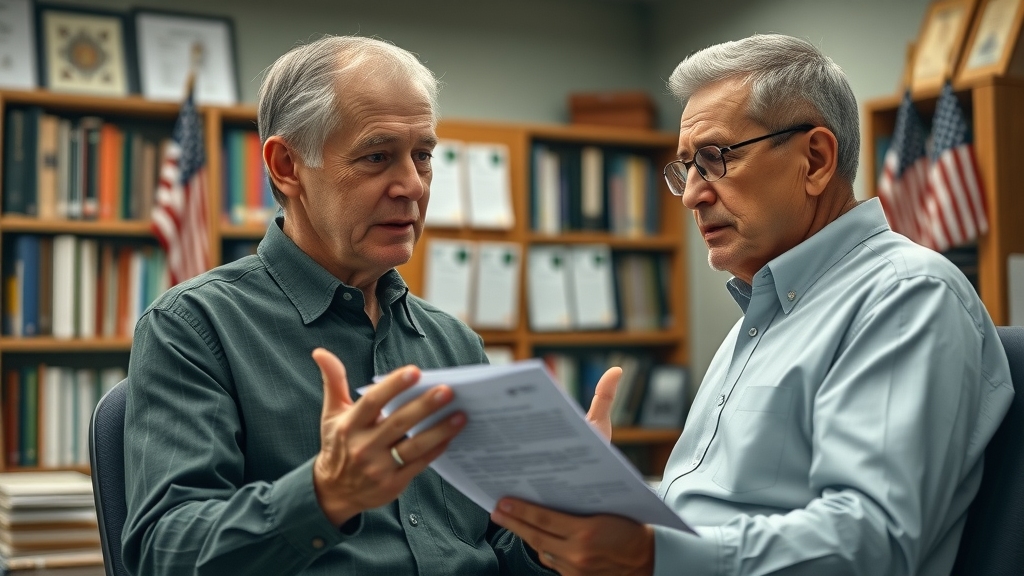Did you know that more than half of all veterans face significant delays when pursuing VA secondary claims? If you’re struggling with VA secondary claims, you’re far from alone. But here’s the game changer: there are proven, actionable strategies that can dramatically improve your chances of success—and help you get the VA disability benefits you deserve, sooner rather than later.
In this guide, you’ll uncover powerful tips, expert insights, and step-by-step walkthroughs tailored for fellow veterans determined to take the confusion out of the VA claims process. If you want to finally connect your secondary conditions, boost your VA disability rating, and navigate the system like a pro —read on.
The Severity of Struggling with VA Secondary Claims: Surprising Statistics and Key Insights

- Recent studies show over 50% of veterans face significant delays with VA secondary claims. Learn why secondary condition claims are among the most misunderstood parts of the entire VA disability process.
Struggling with VA secondary claims isn’t just frustrating—it’s common. Over 50% of veterans report facing cumbersome VA claim delays and repeated denials, especially when filing for secondary service connection . Many applicants feel overwhelmed by confusing paperwork, unclear eligibility rules, and the daunting task of linking a secondary condition to a primary service-connected disability. Often, the difference between a quick resolution and months of waiting comes down to documentation, and many veterans are unaware of these requirements.
The stakes couldn’t be higher. A successful secondary VA claim can lead to a significant increase in your disability rating —which means better disability benefits and overall compensation. Yet, the process remains murky for most, with many failing to provide the critical medical nexus or overlooking essential evidence. Knowing the most misunderstood aspects can make your path to approval much clearer and help you avoid common delays that sideline thousands of fellow veterans every year.
Understanding VA Secondary Claims: What Every Veteran Needs to Know
Mastering the ins and outs of VA secondary claims is crucial if you want to maximize your disability compensation and take control over your benefits journey. Simply put, a secondary condition is a health issue that arises because of a primary service-connected disability . For instance, if you develop depression after chronic pain from a service-connected knee injury, that mental health condition could become a claimable secondary condition.
Too many veterans overlook this path. Properly identifying and service connecting every disability —including those that result from existing service-connected conditions—can dramatically raise your combined rating . Think of a secondary claim as a strategic avenue to not just increase your VA disability rating but also to ensure that all avenues of care, compensation, and recognition are explored.
It's more than a technicality—failing to pursue secondary claims can mean leaving substantial disability benefits on the table. Knowing how these claims work, and why they’re crucial, puts you in the best possible position to succeed.
Defining VA Secondary Claims, Secondary Conditions, and Their Importance
- What is a secondary condition or secondary service connection in a VA claim? Why is it crucial to service connect every disability for a higher VA disability rating?
A VA secondary claim specifically targets health issues that develop as a direct result of a primary service-connected disability. For example, if a veteran experiences sleep apnea stemming from the anxiety caused by PTSD, the sleep apnea can be claimed as a secondary condition. These secondary service connections are vital because each can potentially raise your disability rating and the compensation you receive. Service connecting every possible condition, especially the ones that have developed or worsened because of existing military-related health issues, is the cornerstone of a successful strategy for maximizing your VA disability benefits . Never underestimate the importance of addressing every angle—your financial future and quality of life could hinge on it.
Veterans must be vigilant in documenting every health issue that is aggravated by or stems from an already recognized disability. Incomplete secondary claims or lack of clear service connection often leads to denied or undervalued disability ratings. Make sure you not only understand what constitutes a secondary condition, but also how it directly affects your ability to receive critical disability compensation .
In summary, a strong foundation starts with identifying and pursuing all valid secondary conditions . This thorough approach helps you avoid missed opportunities while ensuring you get the recognition—and benefits—you rightfully deserve as a veteran.
Quick Comparison: Primary vs. Secondary VA Claims
| Primary VA Claims | Secondary VA Claims |
|---|---|
| Evidence Required: Direct link to service, usually from records or incident reports. | Evidence Required: Documented nexus connecting condition to primary service-connected disability. |
| Service Connection: Must prove incident or illness began during active duty. | Service Connection: Must prove condition was either caused or aggravated by service-connected issue. |
| Typical Outcome: Initial disability rating awarded; forms the foundation for all further claims. | Typical Outcome: Increases combined VA disability rating , unlocks additional disability benefits , opens path to further claims. |
Understanding the difference allows you to file more effective claims, reduce the likelihood of denial, and pinpoint exactly what medical nexus or evidence to gather.
Common Secondary Conditions in VA Claims and Top Health Concerns

As more veterans seek to maximize their VA disability benefits , secondary conditions have become some of the most commonly claimed health issues within the entire process. Knowing which secondary conditions are most frequently recognized by the VA can help strengthen your case and provide a clearer path to service connection .
Veterans often struggle with secondary conditions that are either overlooked or misattributed. The right approach involves understanding what these conditions are, how they relate to your primary disabilities, and compiling the medical evidence needed for approval.
With the right planning and support from healthcare professionals, you can ensure that your VA claim properly highlights the full impact of your service, and sets you on the best route to a higher disability rating .
The Most Frequent Secondary Conditions Veterans File
- Mental health conditions
- Sleep apnea
- Joint pain
- Nerve conditions
- Diabetes complications
Issues such as sleep apnea and mental health disorders frequently develop as a direct result of a service-connected disability. For example, insomnia from chronic pain or anxiety from traumatic physical injury are both valid secondary claims . Likewise, nerve and joint pain often emerge due to altered physical mechanics after surgery or injury. Even diabetes complications can evolve as secondary conditions, particularly in veterans taking medications that exacerbate cardiovascular or metabolic risks. Connecting these secondary health issues to your primary disability is not just about increasing your disability compensation —it's about getting the targeted treatment and resources you need for overall wellness.
Veterans must stay alert to emerging symptoms and new diagnoses that could be tied to an existing service-connected disability. Bringing these secondary conditions to the VA’s attention not only boosts your chances of a favorable claim but also ensures your health is holistically evaluated and supported.
By identifying and pursuing these common linkages, you show the VA a complete picture of your service-connected health journey—leading to better outcomes and swifter access to the benefits you have earned.
Top 5 Conditions Secondary to Tinnitus
- Sleep disorders (including sleep apnea)
- Anxiety and depression
- Migraines
- PTSD
- Cognitive problems related to hearing loss
Veterans with tinnitus often develop significant mental health conditions and sleep disturbances, disrupting overall quality of life. It's crucial to link these secondary conditions through medical documentation and a strong nexus letter . For example, the chronic stress of tinnitus may evolve into constant anxiety or exacerbate PTSD symptoms, all of which should be recognized on your secondary VA claim.
Don’t hesitate to demonstrate how one health condition triggers or worsens another. Properly connecting the dots for the VA means a smoother, quicker path to improved disability compensation —and that starts by acknowledging how issues like tinnitus are often the gateway to a host of equally debilitating secondary service connections.
Step-by-Step Guide: Filing and Winning When Struggling with VA Secondary Claims
- Gathering Medical Records and Lay Evidence
- Securing a Strong Nexus Letter for Secondary Service Connection
- Understanding VA Disability Ratings for Secondary Claims
- Effective Communication with VA and Navigating Service Connection Rules
When struggling with VA secondary claims , the difference between approval and denial often boils down to preparation. Start by compiling thorough medical records and seeking out lay evidence —firsthand accounts from family, friends, or fellow veterans who have observed how your secondary condition affects daily life. Next, ensure you have a clear and compelling nexus letter from a healthcare provider, which links your secondary condition to an established service-connected disability.
It’s essential to understand how the VA disability rating system applies to secondary claims. Often, veterans misunderstand how increases in combined ratings work. Finally, stay proactive—communicate clearly with VA representatives, understand which forms you need, and never underestimate the impact of missing documentation. The process can be complex, but breaking it into these steps will put you on the right track toward a successful and expedited claim result.
By focusing your efforts on evidence, expert opinions, and proper filing techniques, you dramatically increase the chances of a positive outcome in your secondary service connection journey.
How to File a Secondary VA Disability Claim
- Essential tips for filing a successful secondary claim, from evidence preparation to understanding VA disability claim processes
The first step is to clearly identify the condition you believe is secondary to your primary, service-connected disability. Next, review your medical records and gather pertinent treatment notes and statements from medical specialists that support the link. Always include a robust nexus letter —this document is often the linchpin of successful secondary claims.
Submit your VA disability claim via the VA’s online portal, paper forms, or with the help of a veteran service organization (VSO). Ensure every piece of supporting evidence is submitted with your claim, as incomplete documentation is a leading cause of delays. Don’t be afraid to reach out to veterans’ consultants if you encounter obstacles or need clarification about which secondary service connection rules apply in your specific case.
Finally, keep up with communication—respond promptly to any VA requests for additional evidence or appointments. Attention to detail, persistence, and organization are your most powerful assets when you file a claim for secondary conditions.
Accelerating the Process: How Long Do Secondary VA Claims Really Take?
"While standard VA claims can take many months, secondary claims often resolve faster with accurate documentation and a robust nexus letter. On average, expect a range between 4 to 6 months, but delays can occur without strong evidence."
The average processing time for a secondary VA claim generally falls between 4 and 6 months, but much depends on the strength and completeness of your submission. Solid medical evidence , a well-argued nexus letter , and timely responses can considerably shorten this period. However, incomplete records or poorly articulated service connection arguments nearly always result in longer waits, additional reviews, or outright denials.
Transparency in your claim, clear documentation, and consistent communication with VA personnel all play critical roles in minimizing delays. It’s not just about the clock—it’s about ensuring every phase of your disability claim is watertight and backed by comprehensive service connection evidence. With proper planning, you can bypass the most common pitfalls and receive your benefits much sooner than average.
Unpacking the Most Common Secondary Claims to PTSD

- Sleep apnea linked to PTSD
- Chronic pain syndromes
- Substance abuse disorders
- Gastrointestinal issues
- Hypertension as a secondary condition
PTSD is one of the most frequent bases for secondary VA claims due to its ripple effect on both mental and physical health. Many veterans develop sleep apnea or chronic pain syndromes as the stress and hypervigilance from PTSD disrupt healthy sleep and exacerbate muscle tension. Substance abuse disorders are another common outcome, as veterans may attempt to self-medicate the side effects of unresolved trauma.
Gastrointestinal issues—sometimes caused or worsened by medications taken for PTSD—should also be recognized, as they directly impact daily living and quality of life. Similarly, many veterans develop hypertension either as a direct response to chronic anxiety or as an indirect result of long-term medication use. Every new secondary health condition tied to PTSD is an opportunity to claim additional disability compensation and improve your disability rating .
The key is to frame each of these conditions as developing in direct response to your service-connected PTSD, backed by expert medical opinions and careful documentation. Don’t hesitate to pursue all potential angles—your health and your VA benefits depend on it.
Leveraging a Nexus Letter for VA Secondary Claims Success
"A clear, detailed nexus letter connecting your secondary condition to a primary service-connected disability is the backbone of your secondary VA claim."
- Best practices for securing persuasive nexus letters, including working with experienced healthcare providers
Your nexus letter is often the single most powerful document in winning secondary service connection. It’s a written medical opinion, preferably from a specialist familiar with your case and VA requirements, that explicitly draws the line between your primary disability and any secondary conditions. The best nexus letters are thorough, reference specific medical evidence, and provide a step-by-step explanation detailing how your current symptoms are at least “as likely as not” caused or aggravated by your confirmed service-connected disability.
Always work with experienced and credentialed healthcare providers—while a VA doctor is excellent, private physicians with VA experience can be just as effective, provided they clearly state their credentials and the evidence base for their medical opinion. A well-crafted nexus letter can transform a previously denied secondary claim into a success story.
Remember, the VA places significant weight on medical nexus evidence. Take your time, communicate openly with your provider about your service history, and ensure every part of the connection is clearly explained in your documentation.
Crucial Evidence: Service Connection, Documentation and the Road to VA Disability Benefits
Medical Evidence That Turns the Tide
- List of documents: Medical records, treatment notes for secondary conditions, statements from specialists, disability rating histories

The backbone of any winning secondary claim is compelling medical evidence . Gather all relevant medical records —not just for your primary condition, but for each and every secondary condition linked to it. Include recent treatment notes, diagnostic tests, and letters from medical specialists that describe how your health has changed since the primary injury or diagnosis.
Don’t overlook the impact of lay evidence . Statements from those who observe your challenges—spouses, family, fellow veterans, or caregivers—carry weight when describing the daily effects of your condition. Keep old claim denials, disability rating histories , and even VA exam reports, as these may contain inconsistencies or hints for building your new claim. The more you submit, the better your odds.
Organization is key—collate everything, label each folder, and keep duplicates of the most critical documents on hand. When it comes to VA disability claims, over-preparation is your best ally.
How to Demonstrate Service Connection for Secondary Disabilities
- Step-wise approach: Show primary disability, secondary service, obtain nexus letter, outline effect on daily life for a stronger disability claim
Start by presenting clear, irrefutable evidence of your primary, service-connected disability. Then gather medical or psychological evaluations that indicate how your new secondary condition developed after—or worsened because of—your initial diagnosis. Your physician should draft a detailed nexus letter using precise medical terminology and specifics about your service history.
Supplement this with both professional and lay witness statements that outline how the secondary condition impacts your daily activities. Does it limit mobility, create additional health issues, or require special accommodations? Be granular in your descriptions—the more your evidence details the challenges, the stronger your claim becomes.
This stepwise, methodical approach puts you in the best possible light and demonstrates to the VA a directly traceable, service-connected pipeline of events resulting in your disability rating .
Overcoming Major Challenges When Struggling with VA Secondary Claims
- Navigating VA bureaucracy and documentation demands
- Addressing denied disability claims
- Correcting inadequate disability rating assignments
- Utilizing resources for improved secondary service connection
The most common hurdles faced by veterans include wrestling with vast amounts of paperwork, unclear requirements, or repeated denials. Each rejection can feel personal, but understanding the specific reasons (such as a weak nexus letter or insufficient evidence) is key. Veterans often underestimate the power of seasoned advocates: working with veterans’ consultants or legal advocates increases your chances of overturning a denial or securing a higher rating on reconsideration.
Don’t be afraid to appeal. Many secondary claims are initially rejected simply due to insufficient documentation, not because the underlying connection isn’t valid. Use feedback from VA denials to pinpoint evidence gaps, correct errors, or submit new evidence. Every challenge is an opportunity to build a stronger case, and persistence is often the deciding factor between approval and continual frustration.
Remember, you’re not alone—there are resources and skilled professionals eager to help veterans like you win the recognition and compensation you’ve earned.
People Also Ask: Expert Answers to Your Pressing VA Secondary Claim Questions

How to win a secondary VA claim?
- To win a secondary VA claim: Obtain a strong nexus letter linking your secondary condition to an established service-connected disability, supply robust medical evidence, and clearly document how your secondary condition impairs your quality of life. Timely and accurate filing improves success.
Success starts with a compelling nexus letter and clarity of documentation. Ensure that every secondary condition is supported by current medical records and that the service connection is fully explained. Use examples, witness testimonies, and keep all documentation up to date.
The fastest way to win is to be thorough: organize your records, double-check every form, and follow up with both the VA and your healthcare providers until your claim is complete.
What are the top 5 conditions secondary to tinnitus?
- Top 5 conditions secondary to tinnitus are: 1. Sleep disorders (including sleep apnea) 2. Anxiety/depression 3. Migraines 4. PTSD 5. Hearing loss-related cognitive problems.
These secondary conditions result from the chronic stress, neurological changes, and sleep disruptions associated with tinnitus. For many, tinnitus can open the door to numerous other valid claims when identified and documented early.
Make sure to mention and document each of these possible secondary health issues when consulting your healthcare provider or writing your claim statement.
How long do secondary claims take VA?
- Secondary VA claims typically process within 4–6 months but can be delayed by incomplete evidence or unclear service connection. Proper documentation and expert nexus letters help speed up decisions.
A well-prepared claim with thorough evidence and a clear service connection statement has the best chance of moving quickly. Incomplete claims or missing documentation are the number one reason for extended wait times.
Organization, persistence, and regular follow-ups with the VA can ensure your claim is not needlessly delayed.
What are the most common secondary claims to PTSD?
- Most common secondary claims to PTSD include sleep apnea, hypertension, substance abuse, chronic pain conditions, and gastrointestinal issues resulting from medication side effects or prolonged stress.
Each of these secondary conditions can form the basis for an increase in your disability rating and improved disability compensation . Track all new medical diagnoses and communicate these to your provider as part of your ongoing care.
Understanding this broader picture can make a significant difference in both approval speed and the level of benefits awarded.
Proven Tips for Improving Your VA Disability Rating Through Secondary Service Connection
- Re-examine existing service connected disabilities
- Identify all potential secondary conditions
- Engage with specialized veterans’ consultants
- Collect detailed lay evidence and buddy statements
- Request re-evaluation for higher disability rating if justified
Systematically reviewing your service-connected disabilities opens the door to overlooked secondary conditions . Consult veterans’ advocates or VA-backed consultants, who can often spot claim connections and service linkages that might escape notice. Gather witness statements (sometimes called "buddy letters") to showcase the day-to-day impact of your conditions.
Regularly review your current rating and compensation—not just after denial or worsening symptoms. If your medical status changes or new evidence emerges, promptly request a re-evaluation to ensure you’re receiving the rating you truly deserve.
Stay proactive—these simple steps can result in a dramatic improvement in both your VA disability rating and overall peace of mind.
Real Veteran Stories: Facing and Overcoming VA Secondary Claim Obstacles
"After three denials, working with a veterans consultant helped me secure a 70% disability rating for a secondary service connection—changing my quality of life."
Real veterans know the struggle of repeated denials and the frustration of unexplained or low disability ratings . But persistence and expert support are often the turning points. Many succeed only after appealing, strengthening documentation, or eliciting help from veteran service organizations or consultants—demonstrating that your efforts, no matter how daunting, can pay off.
Don’t view each setback as failure. Instead, treat them as stepping stones and learning opportunities that can lead to breakthroughs in your service connection and disability benefits .
The lesson? There’s always a path forward—and connecting with experienced allies puts you on the fast track to claim success.
FAQs About Struggling with VA Secondary Claims
- Can I claim multiple secondary conditions at once? Yes, if you can prove each is linked to your service-connected disability.
- What is a secondary service connection? It’s when a new disability arises due to an existing VA-disability-rated condition.
- Do nexus letters need to come from VA doctors? Not necessarily; qualified private physicians are acceptable if credentials and evidence are clear.
File every legitimate secondary claim with clear documentation and supporting nexus letters. Utilize both VA and private medical experts, and always connect the diagnostic dots with your primary condition.
Remember: thoroughness, accuracy, and clear linkage are the keys to getting your full benefits.
Key Strategies to Support Your Secondary Claim and Service Connection
- Build relationships with medical professionals for evidence
- Stay persistent after denials
- Understand VA disability compensation appeals
- Monitor new health conditions for secondary service connections
Establish close ties with your health care team, ensuring that every new diagnosis is evaluated for possible secondary service connection. Appeal denials decisively, and consider outside help from consultants or VSOs to guide the appeals process.
Vigilance is essential. Regularly review your medical status and VA disability claims for new developments, and file promptly when secondary conditions emerge to avoid missing retroactive benefits.
With a systematized approach and the right support, conquering the challenges of struggling with VA secondary claims becomes entirely achievable.
Table: Checklist and Timeline for Filing a Secondary VA Claim
| Action Item | Time Frame |
|---|---|
| Collect all medical records and documentation | 2 weeks |
| Request and obtain a detailed nexus letter | 2-4 weeks |
| Prepare and organize your claim package | 1 week |
| VA review and processing | 4-6 months |
Video Walkthrough: How to File a Secondary Condition Claim for VA Disability
- Embedded video demonstrating a step-by-step secondary claim filing process, highlighting best practices for claim submission and common pitfalls to avoid.
- First-hand video testimony from a veteran who navigated the secondary VA claim process, detailing challenges faced, key documentation, and successful outcome.
- Video interview with a VA-certified consultant on strategies for upgrading a VA disability rating using secondary service connection evidence.
What You Should Remember When Struggling with VA Secondary Claims
- • Secondary service connection is a vital path to full disability compensation
- • Meticulous evidence and a clear nexus letter increase success
- • Consult professionals for complex or denied claims
- • Perseverance is key in the VA secondary claim system
When navigating the complex world of VA secondary claims , these principles ensure you stay on track toward a positive outcome—and get the full support your service has earned.
Feeling Overwhelmed Struggling with VA Secondary Claims?
- Get expert guidance and personalized support on your journey to VA disability compensation. Visit our website: https://vitalveteransconsultants.com/
For step-by-step advice, consultation, and answers to your toughest secondary claim questions, reach out now, and get the help you’ve earned!
Take action: Gather your documentation, partner with professionals, and pursue every possible secondary condition to secure your rightful VA disability compensation—start today!
 Add Row
Add Row  Add
Add 



Write A Comment